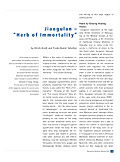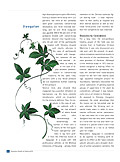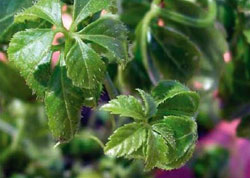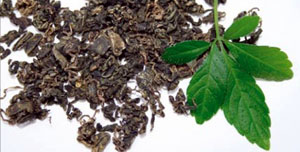|
||||||||
|
Jiaogulan – "Herb of Immortality"Within a few years of medicinal researching, this healing tea – legendary in parts of Asia – advanced to the royal league of the best plant remedies in the world: Jiaogulan, the “Herb of Immortality:” “Five Leaves Ginseng”.Von Ulrich Arndt Aided by Ginseng Healing Powers Jiaogulan researchers at the Japanese Ehime University
of Matsayuma, at the Medical Schools at Guiyang and Hengyang, at
the University of Traditional Chinese Medicine of Shanghai and
at Loma Linda University in California all attest to the rain forest
plant: Jiaogulan improves the nutrient supply of all internal organs
and the cardiac output and thus blood circulation in general. It
has a positive influence on the endocrine system and regulates
the central nervous system. In times of stress the plant is able
to harmonize lapses of the organism and sexual disturbances. It
also protects the liver and regulates the cholesterol level and
the lipid metabolism. Its antioxidant effect, which protects cells
from premature ageing, is of particular importance. Here, Jiaogulan
activates the release of the super oxide dismutase (SOD) – a
very strong endogenous antioxidant production which decreases with
age. Several studies published in the renowned Journal of Traditional
Chinese Medicine prove: amongst others, Jiaogulan prevents apoplectic
strokes, heart attacks, arteriosclerosis and numerous other diseases
and is able to reduce the number of cancerogenous substances in
the body. Even an active ingredient amount contained in 2-4 teaspoons
of the herb is effectual. Discovery by Coincidence For a long time, the extraordinary healing power
of the herb was not noticed. Even in Traditional Chinese Medicine
it was only discovered very late and, until the present, its application
remained constricted mainly to the vicinity of the southwestern
Chinese province of Guizhou. Although a first medical study in
1972 had attested Jiaogulan a healing effect on chronic obstructive
pulmonary disease, the “wonder herb” really became
known for the first time twenty years ago: Japanese biologists
around Dr. Tsunematsu Takemoto discovered the active substances
of ginseng (special groups of saponines) in the plant by coincidence,
although it was botanically not at all related to Ginseng. High Quality
Bildquellen: ©Ulrich Arndt |
Für weitere Informationen beachten Sie auch die Partnerlinks
Bitte beachten Sie:
Die Informationen dieses webs sind journalistische Aufbereitungen des
jeweiligen Themas und ersetzen keine medizinische Beratung. Bei
gesundheitlichen Problemen und Erkrankungen suchen Sie bitte zuerst einen
Arzt oder Heilpraktiker auf. |
|
|
| |
Home |Impressum |Datenschutz | Links | Bücher
& Seminare | Suche | | Heilmittel | Alchemie | Diagnose | Therapien | Selbsthilfe & Ernährung | Spiritualität & Wissenschaft | Urwissen | Denken & Handeln | Freizeit | |
| © horusmedia.de Ulrich Arndt Rechtliche Hinweise |
|
Bitte beachten Sie: Die Informationen dieses webs sind journalistische Aufbereitungen des jeweiligen Themas und ersetzen keine medizinische Beratung. Bei gesundheitlichen Problemen und Erkrankungen suchen Sie bitte zuerst einen Arzt oder Heilpraktiker auf. Ausdrücklich sei zudem darauf hingewiesen, dass in Artikeln eventuell beschriebene Methoden, Therapien, Hilfsmittel und Nahrungsergänzungen lediglich Hinweise und Verfahren einer alternativen, esoterischen oder traditionellen Erfahrungs-Heilkunde darstellen und keine Heilmittel und anerkannte Therapieformen im Sinne der heutigen Schulmedizin sind. copyright - Urheberrecht Rechtliche Hinweise Die Urheberrechte sämtlicher Texte liegen, sofern nicht ausdrücklich anders gekennzeichnet, bei Ulrich Arndt (im Folgenden der Autor genannt). Inhalte dürfen nur zu Informationszwecken und nicht zum Verkauf oder zur Verbreitung zu gewerblichen oder politischen Zwecken verwendet werden. Kein Artikel, kein Auszug aus einem der Texte, keine Grafik oder Bild dürfen ohne schriftliche Zustimmung des Autors in irgendeiner Weise vervielfältigt, verbreitet oder öffentlich wiedergegeben werden. Ohne schriftliche Einwilligung des Autors dürfen die Datenbank oder Teile von ihr auch nicht in von Datenverarbeitungsanlagen verwendbare Sprachen übertragen oder übersetzt werden und dauerhaft gespeichert. Ausgenommen hiervon sind nur Vervielfältigungen, die technisch zum Zwecke des Einblicks in die Datenbank unumgänglich sind und nur vorübergehend vorgenommen werden. Die Urheberrechte an Bildern und Grafiken liegen manchmal beim Autor, manchmal bei den Zeitschriften, in denen die Artikel erschienen sind, oder bei Dritten. Jegliche Nutzung bedarf der schriftlichen Zustimmung des jeweiligen Rechteinhabers. Der Autor behält es sich ausdrücklich vor, Teile der Seiten oder das gesamte Angebot ohne gesonderte Ankündigung zu verändern, zu ergänzen, zu löschen oder die Veröffentlichung zeitweise oder endgültig einzustellen. Markenrecht Alle in Artikeln eventuell erwähnten Marken- und Warenzeichen unterliegen uneingeschränkt den Bestimmungen des jeweils gültigen Kennzeichenrechts und den Besitzrechten der jeweiligen Eigentümer. Verwendungen bedürfen der schriftlichen Zustimmung des Marken- und Rechteinhabers. Links Einige Seiten dieser Website enthalten Links zu externen Websites. Diese Links ermöglichen Ihnen den Zugang zu weiteren Informationen bestimmter Themen. Trotz sorgfältiger inhaltlicher Kontrolle zum Zeitpunkt der Verlinkung übernimmt der Autor keine Verantwortung und Haftung für die Inhalte externer Links. Für den Inhalt der verlinkten Seiten sind ausschließlich deren Betreiber verantwortlich. Haftungsausschluss Der Autor hat die Informationen der Artikel nach seinem Stand des Wissens zum Zeitpunkt der Entstehung des Artikels und mit journalistischen Sorgfalt erstellt. Sollten sich dennoch unvollständige, fehlerhafte oder illegale Informationen eingeschlichen haben, so bittet der Autor um Entschuldigung, übernimmt aber keinerlei Haftung. Mit den Artikeln dieser Website sind keine Angaben und keine Gewähr zur Eignung der darin enthaltenen Informationen für einen bestimmten Zweck verbunden. So übernimmt der Autor keine Gewährleistung und Haftung im Zusammenhang mit jeglicher Nutzung der Informationen auf dieser Homepage, und in keinem Fall kann er haftbar gemacht werden für besondere oder indirekte Schäden, Folgeschäden, entgangenem Gewinn oder sonstige Handlungen, die aus Nutzung der Informationen resultieren. Sofern Teile oder einzelne Formulierungen dieses Textes der geltenden Rechtslage nicht mehr oder nicht mehr vollständig entsprechen sollten, bleiben die übrigen Teile des Dokuments in ihrem Inhalt und ihrer Gültigkeit davon unberührt. |


 Moreover, medical scientists of „Vanderbilt University Medical
Center“ in Nashville, USA, and other universities found out
that Jiaogulan can lower high blood pressures quite effectively.
During a double blind study with 223 patients, one third of the
probands were given customary conventional medication, one third
received Ginseng, and for one third Jiaogulan was applied. While
94 per cent of the probands treated with conventional medicine
showed clear hypotension, only 46 per cent of the participants
treated with Ginseng showed such results; whereas in the case of
participants treated with Jiaogulan, however, 82 per cent reacted – almost
as many as in the case of alpha blockers administration in conventional
medicine. At the same time, patients with a low blood pressure
do not experience further lowering of the pressure.
Moreover, medical scientists of „Vanderbilt University Medical
Center“ in Nashville, USA, and other universities found out
that Jiaogulan can lower high blood pressures quite effectively.
During a double blind study with 223 patients, one third of the
probands were given customary conventional medication, one third
received Ginseng, and for one third Jiaogulan was applied. While
94 per cent of the probands treated with conventional medicine
showed clear hypotension, only 46 per cent of the participants
treated with Ginseng showed such results; whereas in the case of
participants treated with Jiaogulan, however, 82 per cent reacted – almost
as many as in the case of alpha blockers administration in conventional
medicine. At the same time, patients with a low blood pressure
do not experience further lowering of the pressure.  Jiaogulan
tea consists of the leaves of the rain forest liana, which are
dried naturally and with consideration. The flavour of the tea
is mildly sweet and reminding slightly of liquorice; children quite
enjoy drinking it every day. The perfect tea only consists of the
leaves and not of pieces of branch or bark. One usually takes two
to three teaspoons of tealeaves on one litre of hot water and lets
it strain for three minutes or more. The tea can be enjoyed as
pure Jiaogulan or it can be blended with other herbs. Due to its
sweetish flavour, it improves in particular the aroma of tart or
bitter teas. After about a month, a clear increase of vitality
can be observed.
Jiaogulan
tea consists of the leaves of the rain forest liana, which are
dried naturally and with consideration. The flavour of the tea
is mildly sweet and reminding slightly of liquorice; children quite
enjoy drinking it every day. The perfect tea only consists of the
leaves and not of pieces of branch or bark. One usually takes two
to three teaspoons of tealeaves on one litre of hot water and lets
it strain for three minutes or more. The tea can be enjoyed as
pure Jiaogulan or it can be blended with other herbs. Due to its
sweetish flavour, it improves in particular the aroma of tart or
bitter teas. After about a month, a clear increase of vitality
can be observed.